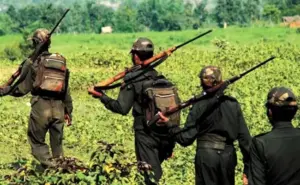Islamic State (IS) said it was behind an attack by suicide bombers and gunmen in the heart of Jakarta on Thursday that brought the radical group’s violence to the world’s most populous Muslim country for the first time. Just seven people were killed despite multiple blasts and a gunfight, and five of them were the attackers themselves, but the brazenness of their siege suggested a new brand of militancy in a country where low-level strikes on police are common. It took security forces about three hours to end the attack near a Starbucks cafe and Sarinah’s, Jakarta’s oldest department store, after a team of seven militants traded gunfire with police and blew themselves up. An Indonesian and a Canadian were killed in the attack. Twenty people, including an Algerian, Austrian, German and Dutchman, were wounded.
“A group of soldiers of the caliphate in Indonesia targeted a gathering from the crusader alliance that fights the Islamic State in Jakarta,” the group said in a statement. It added that 15 people were killed. Mastermind in Raqqa Jakarta’s police chief told reporters: “ISIS is behind this attack definitely,” using a common acronym for Islamic State, and he named an Indonesian militant called Bahrun Naim as the man responsible for plotting it. Police believe Naim is in the Syrian city of Raqqa. The drama played out on the streets and on television screens, with at least six explosions and a gunfight in a movie theatre. But the low death toll pointed to the involvement of local militants whose weapons were rudimentary, experts said.
In a sign of public unease, a bang caused by a tyre bursting triggered a bomb scare that sent police cars rushing back to the scene hours after the attack. “The Starbucks cafe windows are blown out. I see three dead people on the road. There has been a lull in the shooting but someone is on the roof of the building and police are aiming their guns at him,” Reuters photographer Darren Whiteside said as the attack unfolded. Police responded in force within minutes. Black armoured cars screeched to a halt in front of the Starbucks and sniper teams were deployed around the neighbourhood as helicopters buzzed overhead. Jakarta police chief Tito Karnavian said one man entered the Starbucks cafe and blew himself up, wounding several inside.
As people poured out of the cafe, two waiting gunmen opened fire on them. At the same time, two militants attacked a police traffic post nearby, using what he described as hand grenade-like bombs. After the militants had been overcome, a body still lay on the street, a shoe nearby among the debris. Indonesia has seen attacks by Islamist militants before, but a coordinated assault by a team of suicide bombers and gunmen is unprecedented and has echoes of the sieges seen in Mumbai seven years ago and in Paris last November. Australian Attorney-General George Brandis, who was in Jakarta recently to bolster security coordination, told the Australian newspaper he had “no doubt” Islamic State was seeking to establish a “distant caliphate” in Indonesia.
The last major militant attacks in Jakarta were in July 2009, with bombs at the JW Marriott and Ritz Carlton hotels.The country had been on edge for weeks over the threat posed by Islamist militants. Counter-terrorism police had rounded up about 20 people with suspected links to IS, whose battle lines in Syria and Iraq have included nationals from several Asian countries. Indonesia has the world’s largest Muslim population, the vast majority of whom practise a moderate form of Islam. The country saw a spate of militant attacks in the 2000s, the deadliest of which was a nightclub bombing on the holiday island of Bali that killed 202 people, most of them tourists.
Timeline of extremist attacks in Indonesia Indonesia is home to Asia’s deadliest attack by Islamic extremists- the 2002 Bali bombings that killed more than 200 people. There have been many attacks since then, though all resulted in substantially less loss of life. They have often targeted Western tourists or businesses, as Thursday’s bombings in Jakarta did. A look at some of Indonesia’s most serious extremist attacks in this century- Sept. 13, 2000- A car bomb explodes inside the garage of the Jakarta Stock Exchange building, killing 10 people and injuring 16. Police blame Acehnese separatists, who deny involvement. Dec. 24, 2000- Bombs explode at 11 churches across the country on Christmas Eve, killing 19 people and injuring around 100. The al—Qaida—linked, Southeast Asian militant group Jemaah Islamiyah is blamed.
Oct. 12, 2002- An Islamic militant sets off a bomb attached to his vest after walking into a busy nightclub on the resort island of Bali. Many of the revelers who fled are killed by a larger car bomb that explodes minutes later outside another nightclub nearby. The attacks killed 202 people, mostly foreign tourists, including 88 Australians and seven Americans. Authorities blame Jemaah Islamiyah. Dec. 5, 2002- Three people are killed and 15 wounded in the bombing of a McDonald’s restaurant in the city of Makassar on Sulawesi island. Aug. 5, 2003- A car bomb in front of the J.W. Marriott Hotel in Jakarta kills 12 people and wounds 150. Fifteen alleged members of Jemaah Islamiyah were convicted for the blast. Dec. 31, 2003- A bomb tears through a crowded New Year’s concert in Indonesia’s Aceh province, killing 10 people, including three children. Authorities blame separatist guerrillas, who denied involvement.
Jan. 10, 2004- Four people are killed by a bomb in a karaoke cafe in Palopo on central Sulawesi island. Sept. 9, 2004- A bomb explodes close to the Australian Embassy in Jakarta. At least three people are killed and about 100 wounded. Oct. 1, 2005- Suicide bombers strike Bali again in near—simultaneous attacks, this time at two seafood cafes in Jimbaran Bay and a third restaurant in the popular tourist district of Kuta. The attacks killed 23 people, including the three bombers. Dec. 31, 2005- A bomb explodes at a market popular with Christians in Palu, on Sulawesi island, killing seven people. July 7, 2009- Suicide bombers walk into the lounges of the Ritz—Carlton and J.W. Marriott hotels in Jakarta and blow themselves up, killing seven people and wounding more than 50. Jan. 14, 2016- Attackers set off bombs at a Starbucks cafe in central Jakarta and engage police in gunbattles. Police say five attackers and two civilians were killed.
Recent Random Post:

















